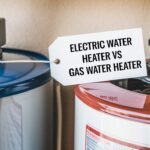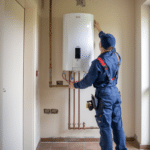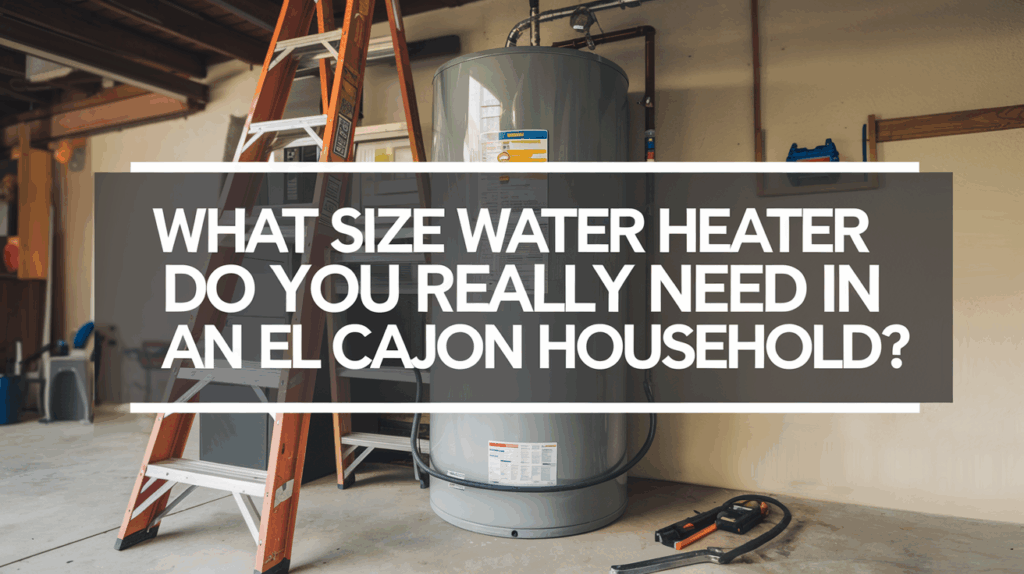
Table of Contents
- Key Takeaways
- Two Types of Water Heaters and How They Work
- What Impacts the Size You Need
- First Hour Rating for Tank Heaters
- Incoming Water Temperature Matters in El Cajon
- Energy Usage and Right-Sizing
- Factors That Make Sizing Different from Home to Home
- Let Voyager Plumbing Help You Choose the Right Fit
If your hot showers don’t last or your utility bill feels higher than it should be, your water heater might not be the right size for your home. This is a common issue we come across as experienced plumbers in El Cajon—especially in homes where usage habits have changed over time.
At Voyager Plumbing, we help homeowners make better decisions by understanding their daily routines, how many people live in the home, and how much hot water is used at once. If you’re unsure whether your current system is too small—or too large—contact us today. We’re here to help you choose the right fit without the guesswork.
Let’s go over what matters so you can choose the right water heater without wasting energy or running out of hot water when you need it most.
Key Takeaways
- The right water heater size depends on your household’s usage habits, not just the number of people in your home.
- Tank water heaters are measured by storage and First Hour Rating (FHR); tankless units are sized by flow rate (GPM).
- Peak usage during the busiest hour of the day is the best indicator for sizing accuracy.
- Local factors like incoming water temperature and plumbing layout affect water heater performance.
- Oversizing or undersizing leads to higher energy bills or running out of hot water.
- Voyager Plumbing offers tailored guidance to help you choose the right unit for your El Cajon home—based on real usage, not guesswork.
Two Types of Water Heaters and How They Work
Before you think about size, you need to know which system you’re working with.
Tank Water Heaters
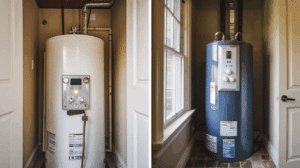 These are standard in many homes across El Cajon. They hold and heat a set amount of water—typically between 30 and 80 gallons. Once that water is used, the tank needs time to refill and heat a new batch.
These are standard in many homes across El Cajon. They hold and heat a set amount of water—typically between 30 and 80 gallons. Once that water is used, the tank needs time to refill and heat a new batch.
Tankless Water Heaters
These systems heat water on demand. There’s no storage tank. Instead, they warm the water as it flows through the unit. Sizing for tankless heaters depends on flow rate, measured in gallons per minute (GPM), rather than storage capacity.
What Impacts the Size You Need
The right water heater size depends on more than just how many gallons it can hold. To get the right fit, you need to look at how your household actually uses hot water each day.
Number of People in the Household
This is one of the first things to look at. A family of five will have different needs than a retired couple. Here’s a general estimate based on U.S. Department of Energy data:
- 1–2 people: 30–40 gallon tank
- 2–3 people: 40–50 gallon tank
- 3–4 people: 50–60 gallon tank
- 5+ people: 60–80 gallon tank
For tankless systems, what matters is how many fixtures might be in use at the same time, and the total water demand during peak hours.
Peak Water Use
Consider what happens during your home’s busiest hour for hot water. Maybe two people are showering while the dishwasher and washing machine are running.
Here’s what typical fixtures use:
- Shower: 2 to 2.5 GPM
- Dishwasher: 1.5 to 2 GPM
- Washing machine: 2 to 2.5 GPM
- Bathroom faucet: 0.5 to 1.5 GPM
- Kitchen sink: 1.5 to 2 GPM
If your morning or evening routine includes multiple activities happening at once, a tankless unit with at least 6 to 7 GPM may be needed to avoid cold water issues.
First Hour Rating for Tank Heaters
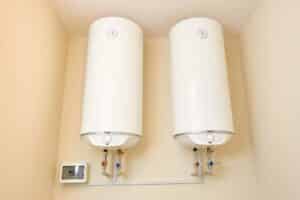 With tank heaters, the First Hour Rating (FHR) is just as important as the tank size. This rating tells you how many gallons of hot water the heater can deliver in the busiest hour.
With tank heaters, the First Hour Rating (FHR) is just as important as the tank size. This rating tells you how many gallons of hot water the heater can deliver in the busiest hour.
To estimate what you need:
- Add up your expected water usage during peak demand
- Choose a tank model with an FHR that meets or exceeds that total
For example, if your home uses about 60 gallons in the morning rush, you’ll want a tank with an FHR in that range to keep up.
Incoming Water Temperature Matters in El Cajon
El Cajon generally has warmer incoming water than colder climates, which helps water heaters perform more efficiently. But colder days or long plumbing runs can still affect delivery.
In homes with longer pipe systems or older plumbing, it may take longer for hot water to reach the tap. This can influence the size or type of system you need—especially with tankless units that heat water in real-time.
Understanding how fast your system can heat water and how far it has to travel helps avoid underperformance.
Energy Usage and Right-Sizing
Choosing a heater that’s too large means you’re constantly heating more water than you use, leading to higher energy bills. Choosing one that’s too small can leave you without hot water when you need it.
To find the balance, check the heater’s energy performance:
- Older models use the Energy Factor (EF)
- Newer models use the Uniform Energy Factor (UEF)
A higher rating means more efficient operation. Matching the size to your actual needs while using a model with a strong energy rating will help reduce waste and monthly costs.
Factors That Make Sizing Different from Home to Home
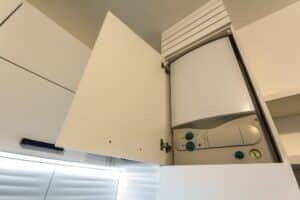 Water heater sizing isn’t universal. Two homes with the same number of people can have very different hot water needs based on plumbing layout, fixture types, and usage patterns.
Water heater sizing isn’t universal. Two homes with the same number of people can have very different hot water needs based on plumbing layout, fixture types, and usage patterns.
For example, a home with low-flow showerheads and energy-efficient appliances will use less hot water than one with older fixtures or large bathtubs. In two-story homes, water may take longer to reach upper bathrooms, which can increase the demand on the system. If you run laundry several times a week or rely on long showers, that also raises your household’s hot water usage.
Looking at how and when water is used—and how far it has to travel—makes it easier to choose the right heater. This goes beyond household size and focuses on real-world behavior.
Let Voyager Plumbing Help You Choose the Right Fit
Choosing the right water heater size involves more than picking a number off a chart. It depends on your habits, your plumbing system, and how your home is set up.
At Voyager Plumbing, we’ve helped homeowners across El Cajon install the right systems—whether that’s upgrading an old tank, converting to a tankless unit, or simply replacing something that no longer meets the needs of the home. We’ll take a look at your layout, daily water use, and budget, and guide you toward an option that works now and in the long run.
If you’re unsure what size system is right for your household, give us a call. We’ll review your setup, talk through how your home uses hot water, and offer real solutions—not guesses.
Call us today to schedule your consultation.



